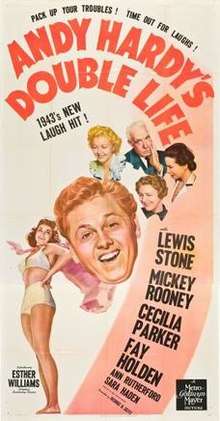Andy Hardy's Double Life
Andy Hardy's Double Life is a 1942 comedy film directed by George B. Seitz. It was the thirteenth installment of MGM's enormously popular Andy Hardy film series starring Mickey Rooney as the title character.
| Andy Hardy's Double Life | |
|---|---|
 | |
| Directed by | George B. Seitz |
| Written by | Aurania Rouverol (characters) Agnes Christine Johnston |
| Starring | Lewis Stone Mickey Rooney Cecilia Parker Fay Holden |
| Music by | Daniele Amfitheatrof |
| Cinematography | George J. Folsey |
| Edited by | Gene Ruggiero |
Production company | |
| Distributed by | Metro-Goldwyn-Mayer |
Release date |
|
Running time | 92 minutes |
| Country | United States |
| Language | English |
| Budget | $369,000[1] |
| Box office | $2,647,000[1] |
It was the feature film debut of Esther Williams.[2] It was the last Hardy film to include the character Polly Benedict, Andy's long-suffering sweetheart, as well as the last to feature Ann Rutherford (who had taken over the role of Polly in the second film of the series).
Premise
Preparing himself for college life, Andy Hardy (Mickey Rooney) promises himself to put an end to his flirting ways and attempts to organize his finances by selling his old car. Things become complicated when his love interest Polly (Ann Rutherford) introduces him to a seductive psychology student (Esther Williams), while his friends continue to delay the payment for his automobile. Andy also tries his best to help his sister Marian (Cecilia Parker) with her own relationship problems and takes an interest in assisting his father Judge Hardy (Lewis Stone) with a complicated case involving an injured boy (Bobby Blake).
Cast
- Lewis Stone as Judge Hardy
- Mickey Rooney as Andy Hardy
- Cecilia Parker as Marian Hardy
- Fay Holden as Mrs. Hardy
- Ann Rutherford as Polly Benedict
- Sara Haden as Aunt Milly Forrest
- Esther Williams as Sheila Brooks
- William Lundigan as Jeff Willis
- Robert Pittard as Botsy
- Bobby Blake as "Tooky" Stedman
- Susan Peters as Sue
Reception
According to MGM records the film earned $1,782,000 in the US and Canada and $865,000 elsewhere, making a profit of $1,499,000.[1][3]
References
- The Eddie Mannix Ledger, Los Angeles: Margaret Herrick Library, Center for Motion Picture Study.
- "Archived copy". Archived from the original on 2012-09-11. Retrieved 2012-08-29.CS1 maint: archived copy as title (link)
- "Top Grossers of the Season", Variety, 5 January 1944 p 54
External links
- Andy Hardy's Double Life on IMDb
- Andy Hardy's Double Life at the TCM Movie Database
- Andy Hardy's Double Life at AllMovie
- Andy Hardy's Double Life at the American Film Institute Catalog